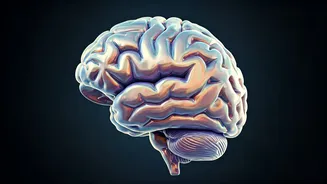Memory Loss Matters
One of the most recognized early signs of dementia is the frequent experience of memory loss. This goes beyond occasional forgetfulness, like misplacing
keys. Individuals affected by dementia might struggle to remember recently learned information, important dates, or events. They might also repeatedly ask for the same information, indicating a difficulty in retaining new knowledge. This form of memory loss isn’t a fleeting lapse but a persistent challenge that interferes with daily routines. It's important to differentiate these memory problems from the typical forgetfulness associated with aging, as the latter tends to involve less severe interference with daily function.
Difficulty Planning, Problem Solving
Beyond memory issues, another early indicator of dementia involves challenges with planning or solving problems. This may manifest as difficulties in following familiar recipes, managing monthly bills, or concentrating on tasks that require sequential steps. The person might struggle with logical thinking, showing an inability to develop a plan or work with numbers. This can affect professional duties, financial decisions, and other complex activities. It is important to look for a noticeable decline from the individual's baseline capabilities; this difference is often more significant than the absolute difficulty level of the task.
Familiar Task Confusion
People with early dementia frequently find that they are unable to complete tasks they have done their whole life. This can range from driving the usual route and getting lost in familiar locations to having trouble with the rules of their favorite games. They might have a hard time remembering how to carry out everyday activities, such as getting dressed or preparing a meal. A person with dementia may get confused about time, places, or even who they are. They may have issues with familiar tasks which they could once do without any effort. These experiences demonstrate a disruption in cognitive functioning that can greatly impact everyday functionality.
Disorientation In Time, Place
Early-stage dementia is often accompanied by disorientation regarding time and place. Individuals might get confused about the day of the week, the season, or the passage of time. They could also have trouble remembering where they are or how they got there. This can be particularly pronounced in unfamiliar environments. Wandering and becoming lost in a familiar location is a common occurrence. Such confusion is more than simply forgetting a detail; it's a breakdown in the ability to understand one’s immediate surroundings. It’s an indication of a more profound cognitive impairment, especially if the disorientation is frequent or persistent.
Visual, Spatial Challenges
Cognitive challenges extend to visual and spatial abilities in the early stages of dementia. Some individuals may have trouble judging distance, determining color or contrast, or understanding visual information. These problems can lead to difficulty with tasks like driving, reading, or recognizing faces. Difficulties may also involve difficulties with visual perception that can result in tripping over objects or spilling liquids. These visual-spatial issues aren’t just about eyesight, rather they're about the brain’s ability to process and interpret visual information, which makes daily activities like navigation and spatial awareness difficult.
Speech, Writing Difficulties
Language difficulties often surface early on. People might struggle to find the right words when speaking, or they may have trouble following or joining a conversation. They might also repeat themselves, or they can pause frequently during speech to attempt to collect their thoughts. Changes in writing skills can also occur, with sentence structure and grammar often becoming disrupted. Understanding what others say can be a challenge. The capacity to articulate thoughts clearly or follow spoken words is often impacted, highlighting the breadth of the cognitive impairment in dementia.
Misplacing Things, Often
A common sign of early dementia is misplacing objects and a growing inability to retrace steps. This goes beyond the occasional forgetfulness of where one has kept their keys. People with dementia might place items in unusual locations—for example, putting a wallet in the freezer. They may have trouble remembering the steps they took to find an item and, thus, may accuse others of hiding or stealing them. This behavior is linked to changes in cognitive function, where the memory processes that support object location are disrupted. This difficulty in tracking objects and backtracking through memories is a sign of a larger problem.
Poor Judgment, Decreased Insight
Impaired judgment is often an early warning sign of dementia. This might manifest as making poor decisions, such as spending excessive amounts of money or engaging in risky behaviors. People might show a lack of awareness of their cognitive changes or an inability to recognize mistakes. They may fail to understand the potential consequences of actions. Poor judgment might also be seen in a lack of attention to personal hygiene or a disregard for social norms. These issues indicate a decline in decision-making and insight, which are often overlooked in the early stages but are indicative of cognitive impairment.
Withdrawal From Social Settings
Social isolation can be an early indicator of dementia. Individuals might lose interest in their usual social activities, hobbies, or group projects. They may start to withdraw from friends, family, and other social interactions. These changes may occur because they have trouble recalling details, following conversations, or managing social situations. The withdrawal may be caused by embarrassment or a desire to hide cognitive difficulties. This withdrawal from the world is one way that dementia can manifest in an individual's life. It is not always a conscious choice, but it can isolate people.
Mood, Personality Changes
Changes in mood and personality can occur in early dementia. People can become irritable, anxious, depressed, or suspicious. These emotional fluctuations may be unrelated to life events. Some individuals may exhibit apathy or lose interest in things they once enjoyed. In some cases, there might be significant changes in personality traits. Someone who was previously outgoing could become introverted, or a person who was normally calm might become easily agitated. These changes show the impact of dementia on brain areas related to emotions and behaviour. Observing these changes helps people recognize the need for a healthcare professional’s consultation.















